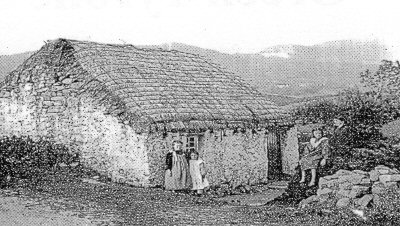John O’Hagan, Young Irelander, was of course, like John Mitchel and John Martin, from Newry and like them he was incensed with
(though the island had, for half a century, been united with and supposedly as one with and equal with its larger neighbouring
‘Take it from us, every grain
We were made for you to drain
Black starvation let us feel
When our rotting roots shall fail
When the hunger pangs assail
Ye’ll have of Irish corn your fill –
We’ll have grass and nettles still!’
Why do we not see the smoke curling from those lowly chimneys? And surely we ought by this time to scent the well-known aroma of the turf-fires?
Yet what…WHAT reeking breath of hell is this oppressing the air, heavier and more loathsome than the smell of death rising from the fresh carnage of the battle field? Oh misery! Had we forgotten that this was the Famine Year, and we are here in the midst of those thousand Golgothas that border our island with a ring of death, from
We walk amid the houses of the dead and out at the other side of the cluster, and there is not one where we dare to enter. We stop before the threshold of our host of two years ago: with eyes shut we put our heads inside the door-jamb and, with shaking voice we call out, ‘God bless all here!’ No answer – ghastly silence, and a mouldy stench, as from the mouth of a burial-vault.
Ah! They are dead! All dead! The strong man and the fair, dark-eyed woman and the little ones, with their liquid Gaelic accents that then melted into music for us. They shrunk and withered together until their voices dwindled to a rueful gibbering, and they hardly knew one another’s faces; but their horrid eyes scowled on each other with a cannibal glare.
We know the whole story: the father was on a ‘public works’ and earned the sixth part of what would have maintained his family, which was not always paid to him; but still it kept them half-alive for three months, so that instead of dying in December they died in March. And of the agonies of those months, who can tell? – the poor wife, wasting and weeping over their stricken children; the heavyladen weary man, with black night thickening around him – thickening within him – feeling his own arm shrink and his step totter with the cruel hunger that gnaws away life, and knowing too surely that soon all this will be over.
And he has grown a rogue too, on those public works; with roguery and lying all around, he has begun to say in his heart that there is no God: from a poor but honest farmer he has sunk down into a swindling, sturdy beggar: for him there is nothing firm or stable: even ferocity or thirst for vengeance he cannot feel again. The very blood of him is starved into a thin, chill serum and if you prick him he will not bleed.
Now he can totter forth no longer and he stays at home to die. But his darling wife is dear to him no longer; alas! Alas! There is a dull, stupid malice in their looks ; they forget that they had five children, all dead weeks ago, and flung coffinless into shallow graves – nay, in the frenzy of their despair they would rend one another for the last morsel in that house of doom.
John Mitchel, Jail Journal, 1854
… Young Ireland series ? …
